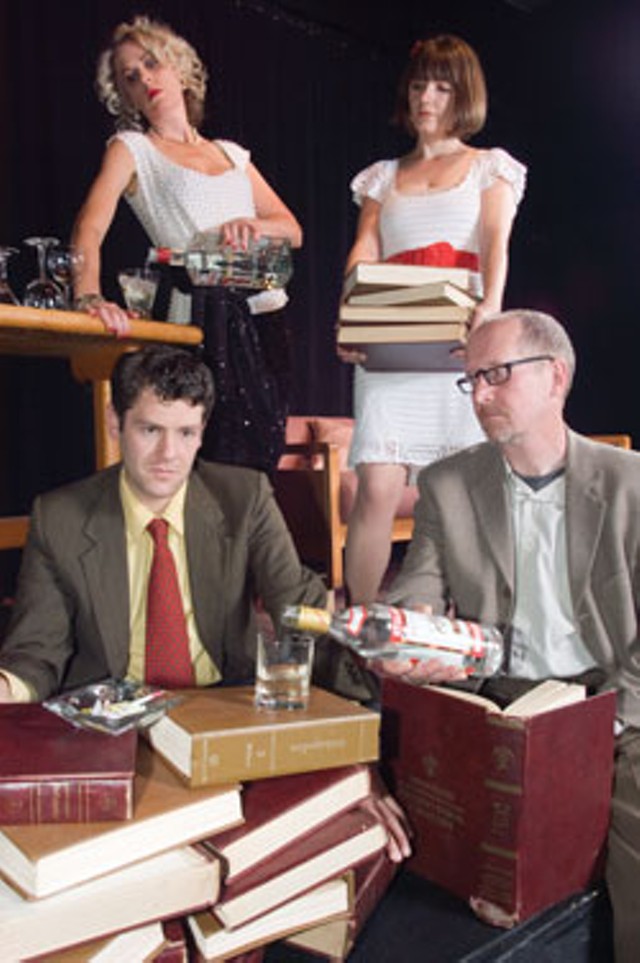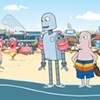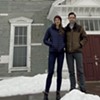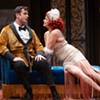Published June 23, 2010 at 5:36 a.m.
Stephen Goldberg’s new play, Who’s Afraid of Edward Albee, takes place in the wee, small hours of the morning in the living room of Sandra and Harry Kline. In the first scene, a booze-addled Sandra asks her husband, who’s attempting to read on the couch, about a strange sound coming from another room (offstage). He retorts that it’s probably the ice machine trying to keep up with her. The clever comeback helps set the tone for a play that’s propelled by a relentless stream of barbs and counterbarbs.
Theatergoers familiar with Goldberg’s voice — honed in writing some 23 original plays to date — will readily connect the remark with the playwright’s persistent concern with humanity’s dark moods and machinations. And they won’t be the least bit surprised by the rough edges in his latest work, a 70-minute one-act running at Burlington’s new Off Center for the Dramatic Arts — the first full run of a play in the space. While credit for the play’s basic structure must go to Edward Albee and his 1962 play Who’s Afraid of Virginia Woolf? (and its 1966 film adaptation), the crookedly comic heart of Who’s Afraid of Edward Albee is pure Goldberg. As such, the work is not meant as a parody of Albee’s modern classic. But there are clear parallels and references that keep the earlier play in mind. Familiarity with Albee’s original may enhance the experience of seeing Goldberg’s variation, but is not a pre-requisite to being both amused and agitated by the latter.
These two states of mind sum up the overall effect of the play as well as the characters’ effect on one another. From the opening beat, Sandra (Monica Callan) and Harry (Rob Donaldson) banter with put-downs that, though toxic at times, somehow fail to get much of a rise out of either. The game, it seems, is to probe for the other’s weak spot. She’s a sophisticate, the daughter of moviemakers, and her best jabs strike at her husband’s humbler origins — in particular his father, a teacher in Chicago public schools. Harry’s current work, as a hack screenwriting professor with a PhD in literature, also leaves him open for more direct abuse. Harry’s best shots at Sandra hit her in the ego, ridiculing her strenuous efforts to appear sexually desirable well past her prime.
Sandra and Harry’s general quarreling soon latches on to a more specific matter — the imminent visit by one of Harry’s screenwriting students, Daisy, and her husband, George. While the young couple has been attending a film screening of The Battleship Potemkin, Sergei Eisenstein’s 1925 silent film, Harry has been reading George’s screenplay and preparing feedback. As Harry complains to Sandra about what dreck the young man has written, she complains that Harry isn’t putting any thought into bedding down Daisy. What follows, upon Daisy and George’s arrival, is predictable enough: an effort on both Sandra’s and Harry’s parts to seduce George and Daisy, respectively.
This plot might be compelling if there were something at stake for the characters. In this dysfunctional parlor drama, however, it’s only George, played by David C. Symons, who struggles against the inevitable descent into depravity. Of the four characters, his seems to have been drawn with the most nuance, and Symons plays it square, naïve and malleable without going too broad. Genevra MacPhail’s Daisy, in contrast, arrives half in the bag from the postscreening reception, and continues to drink excessively. As a result, she is never able to evoke any depth, particularly in her efforts to not be taken advantage of, that might have elicited viewers’ sympathy. Not that the prospect of being seduced causes her much concern.
For Sandra and Harry, all of this is just a twisted game. They display so little credible humanity that it’s hard to feel either loathing or sympathy — or anything else — for them.
The plot of Who’s Afraid of Edward Albee is as loose as its characters, and that is what makes it agitating at times. It’s also a hallmark of Goldberg’s style. His fans — and they include some veteran local actors — praise his plays’ “improvisational” feel. When this works, the result is a provocative wallowing in untidy truths of the human condition, often embodied by hookers, murderers and other lowlifes. Maybe because the characters in Edward Albee are somewhat refined, all that heat on stage fails to produce much light — at least not in the sense of illumination.
The play does, however, have its light — that is, humorous — moments. Goldberg’s cast members are at their best when he mines their respective characters’ flaws for laughs. Sandra would be tedious were it not for Callan’s keen sense of her character’s deep-seated need for male sexual attention. She manages to play outrageous and pathetic in the same gesture. Her biggest laugh is a repetitive reminder to Daisy that Harry isn’t a real doctor. (A few flubbed lines on opening night drew unintended titters.) Donaldson, too, shines most brightly when going for comical over cool, such as in his explosive reaction to his guests’ ignorance of the play Who’s Afraid of Virginia Woolf? Of course, they’ve seen the movie. Comic situations are hit and miss here, though; some generate raunchy chuckles, while others tug the play jarringly into the absurd.
Right up to the play’s final moment, Who’s Afraid of Edward Albee shows an unflinching disregard for the tight storylines and unified tone of much mainstream theater. If this is sometimes a strength for playwright Goldberg, it’s also this play’s chief weakness. There may be poetry here, but it’s less likely to be found in lines of dialogue (surely not in Sandra’s request to George, “Look at me with the eye of a sausage”) than in Goldberg’s prolific output and uniquely jaundiced vision.
Want to see for yourself?
Who’s Afraid of Edward Albee, written and directed by Stephen Goldberg, produced by Off Center for the Dramatic Arts in Burlington. June 23, 25 & 26, 8 p.m. $15. Info and tickets, 540-0773. www.offcentervt.com
More By This Author
About the Artist

Matthew Thorsen
Bio:
Matthew Thorsen was a photographer for Seven Days 1995-2018. Read all about his life and work here.
Matthew Thorsen was a photographer for Seven Days 1995-2018. Read all about his life and work here.
Speaking of...
-

Executive Director Kurt Thoma Leaves Barre Opera House
Mar 5, 2024 -

Vermonter's Musical Bound for Broadway With Hillary Clinton as a Producer
Oct 25, 2023 -

Phantom Theater Finds New Winter Venue in Waitsfield
Oct 13, 2023 -

Double E 2023 Summer Concert Series Kicks Off With the Wailers
Mar 17, 2023 -

Off Center for the Dramatic Arts to Reopen in the New North End
Sep 23, 2022 - More »
Comments
Comments are closed.
From 2014-2020, Seven Days allowed readers to comment on all stories posted on our website. While we've appreciated the suggestions and insights, right now Seven Days is prioritizing our core mission — producing high-quality, responsible local journalism — over moderating online debates between readers.
To criticize, correct or praise our reporting, please send us a letter to the editor or send us a tip. We’ll check it out and report the results.
Online comments may return when we have better tech tools for managing them. Thanks for reading.














































